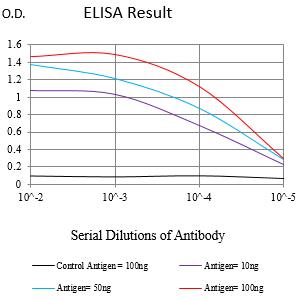
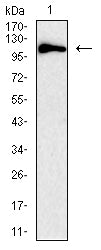
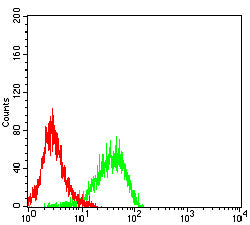
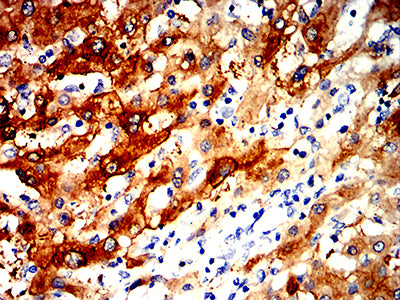
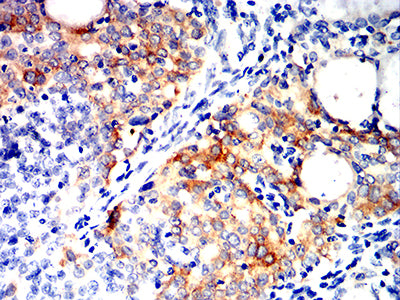
| WB | 1/500 - 1/2000 | Human,Mouse,Rat |
| IF | 咨询技术 | Human,Mouse,Rat |
| IHC | 1/200 - 1/1000 | Human,Mouse,Rat |
| ICC | 技术咨询 | Human,Mouse,Rat |
| FCM | 1/200 - 1/400 | Human,Mouse,Rat |
| Elisa | 1/10000 | Human,Mouse,Rat |
| Aliases | FDH; FTHFD; 10-fTHF; 10-FTHFDH |
| Entrez GeneID | 10840 |
| clone | 1C1A7 |
| WB Predicted band size | 98.8kDa |
| Host/Isotype | Mouse IgG1 |
| Antibody Type | Primary antibody |
| Storage | Store at 4°C short term. Aliquot and store at -20°C long term. Avoid freeze/thaw cycles. |
| Species Reactivity | Human, Rat |
| Immunogen | Purified recombinant fragment of human ALDH1L1 (AA: 10-222) expressed in E. Coli. |
| Formulation | Purified antibody in PBS with 0.05% sodium azide |
+ +
以下是3篇与ALDH1L1抗体相关的文献摘要及作者信息,供参考:
1. **文献名称**:ALDH1L1 is a marker of malignant glioma stem cells and a therapeutic target
**作者**:Mao P. et al. (2013)
**摘要**:研究证实ALDH1L1在胶质瘤干细胞中高表达,通过特异性抗体检测发现其与肿瘤侵袭性相关,提示其作为治疗靶点的潜力。
2. **文献名称**:Cellular localization of ALDH1L1 in the human brain
**作者**:San Martín L.P. et al. (2013)
**摘要**:利用ALDH1L1抗体进行免疫组化分析,发现该蛋白主要定位于星形胶质细胞线粒体,支持其在叶酸代谢中的功能。
3. **文献名称**:Loss of ALDH1L1 correlates with poor prognosis in hepatocellular carcinoma
**作者**:Chen Y. et al. (2019)
**摘要**:通过免疫组织化学(使用ALDH1L1抗体)发现,肝细胞癌中ALDH1L1表达下调与患者生存率降低显著相关,提示其抑癌作用。
注:实际文献需通过PubMed/Google Scholar检索确认,以上为模拟核心内容。建议以具体研究目的筛选抗体应用场景(如癌症/代谢/神经领域)。
ALDH1L1 (Aldehyde Dehydrogenase 1 Family Member L1) is a cytosolic enzyme that plays a critical role in folate metabolism by catalyzing the conversion of 10-formyltetrahydrofolate to tetrahydrofolate and CO₂. This reaction is essential for regulating cellular folate pools and maintaining one-carbon metabolism, which supports nucleotide synthesis and methylation processes. ALDH1L1 is highly expressed in metabolically active tissues, including the liver, kidney, and brain, and its expression is often downregulated in cancers, suggesting a potential tumor-suppressive function.
The ALDH1L1 antibody is a key tool for detecting and quantifying ALDH1L1 protein expression in research. It is widely used in techniques like Western blotting, immunohistochemistry (IHC), and immunofluorescence (IF) to study tissue-specific expression patterns, subcellular localization, and alterations in disease states. Studies utilizing this antibody have linked ALDH1L1 deficiency to metabolic disorders, neurodegenerative diseases, and cancer progression. For example, reduced ALDH1L1 levels in hepatocellular carcinoma or glioblastoma correlate with poor prognosis, emphasizing its role in cellular homeostasis.
Additionally, ALDH1L1 antibodies aid in distinguishing between different ALDH isoforms, as the ALDH superfamily includes multiple members with overlapping functions. Researchers also employ these antibodies to explore ALDH1L1's interaction with signaling pathways, such as oxidative stress responses and apoptosis. Overall, ALDH1L1 antibodies are vital for advancing our understanding of folate-driven metabolic regulation and its implications in health and disease.
×